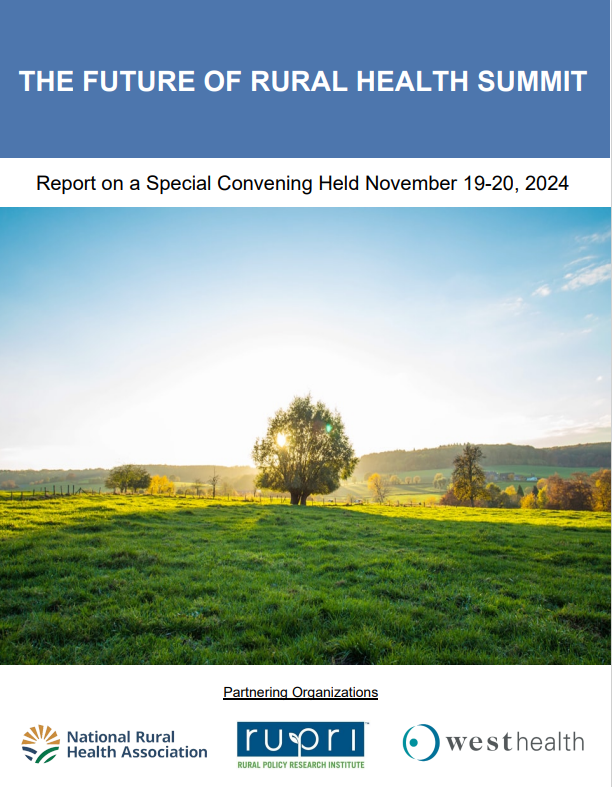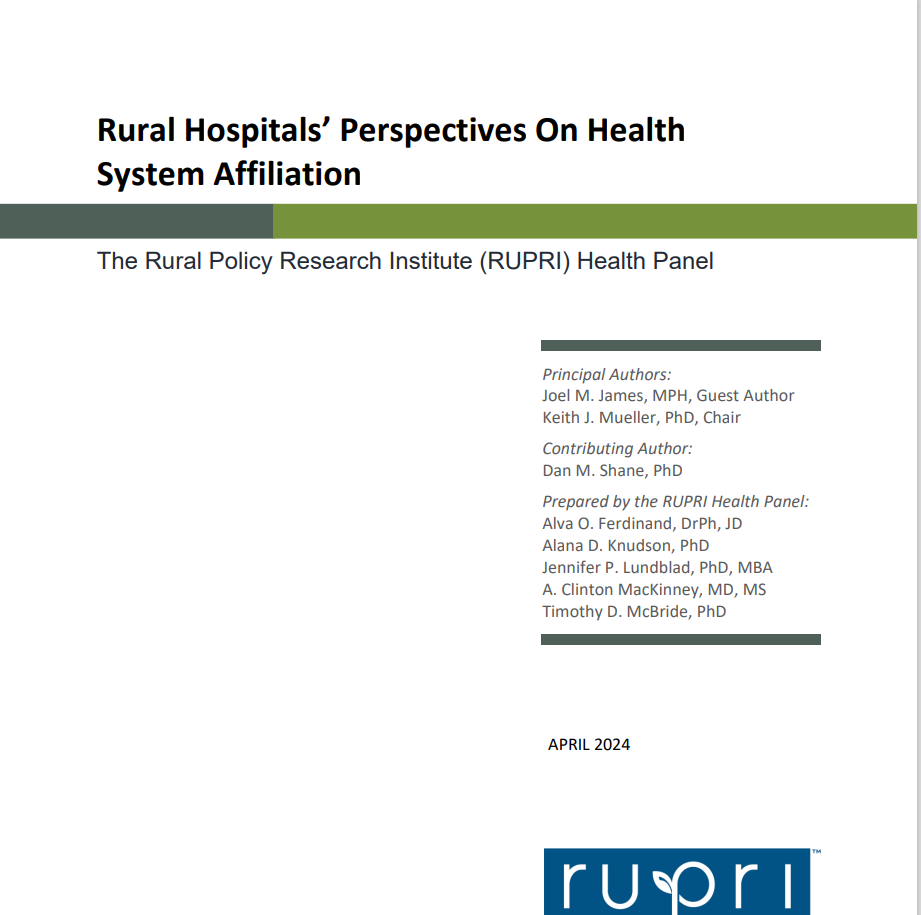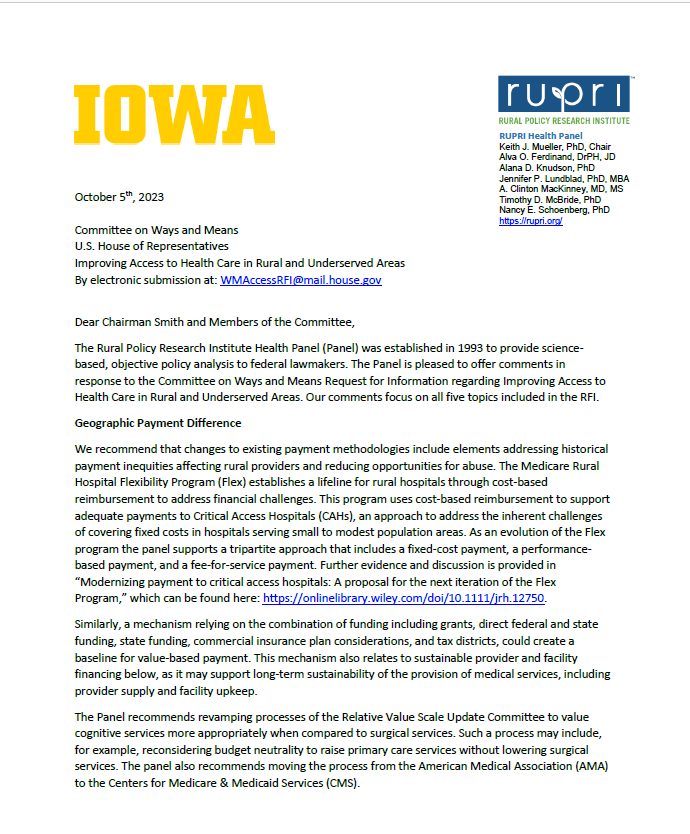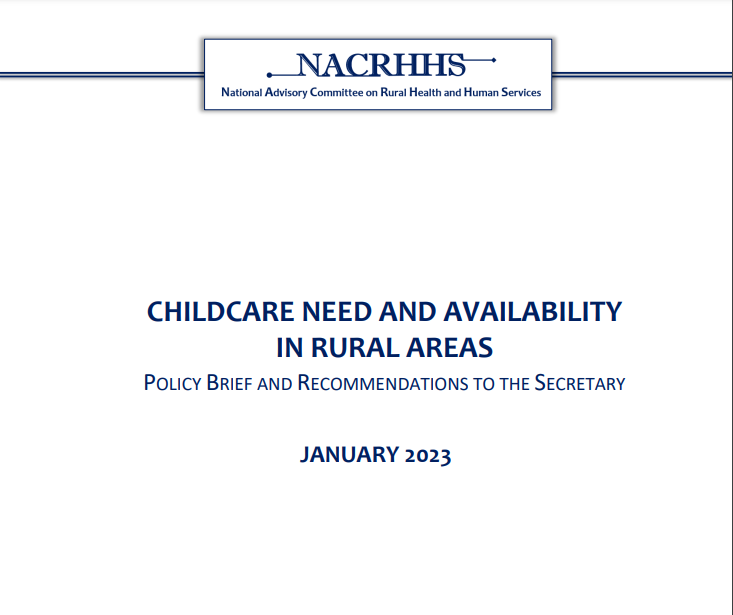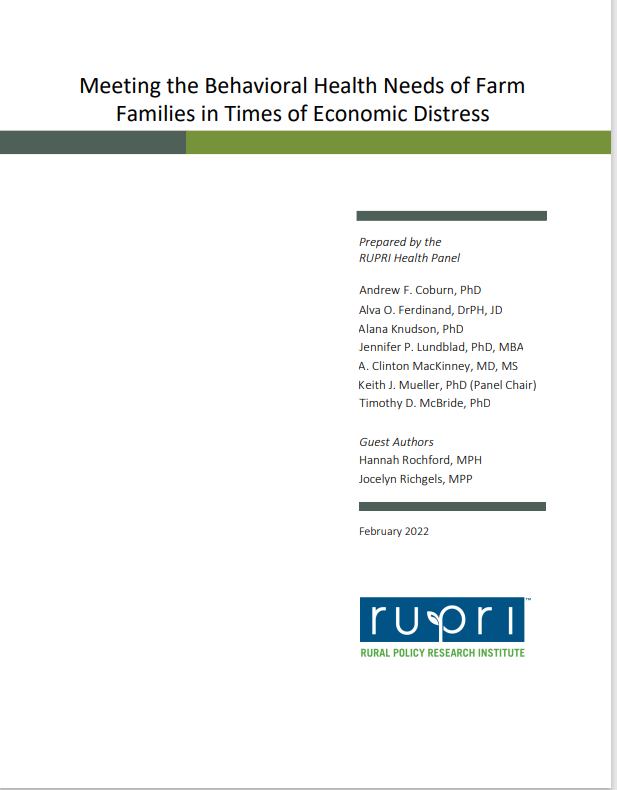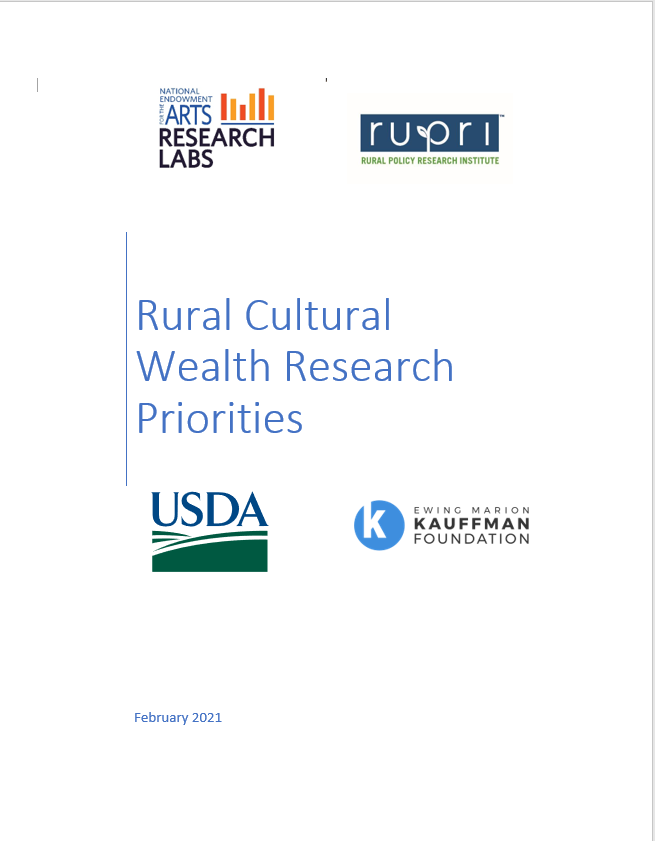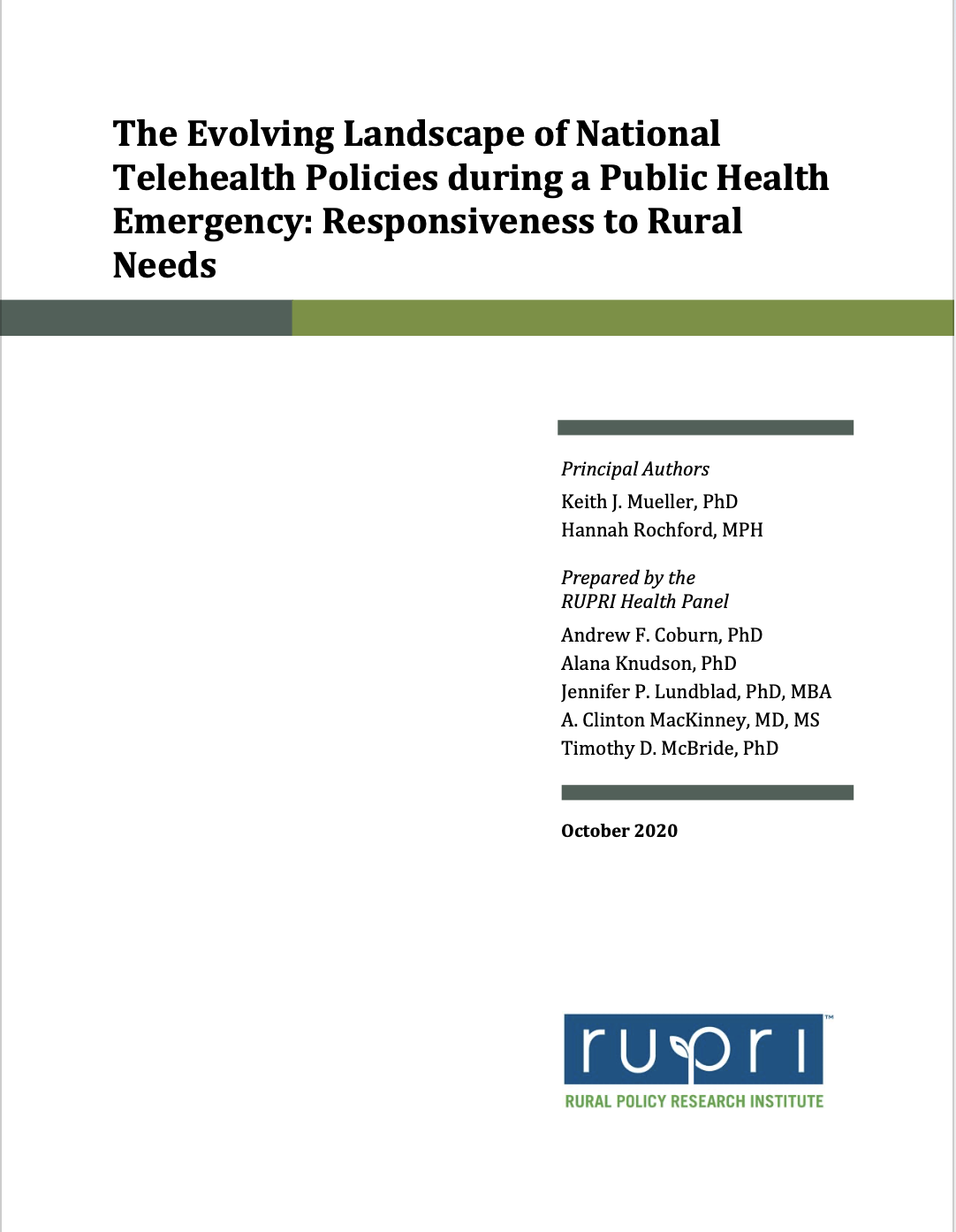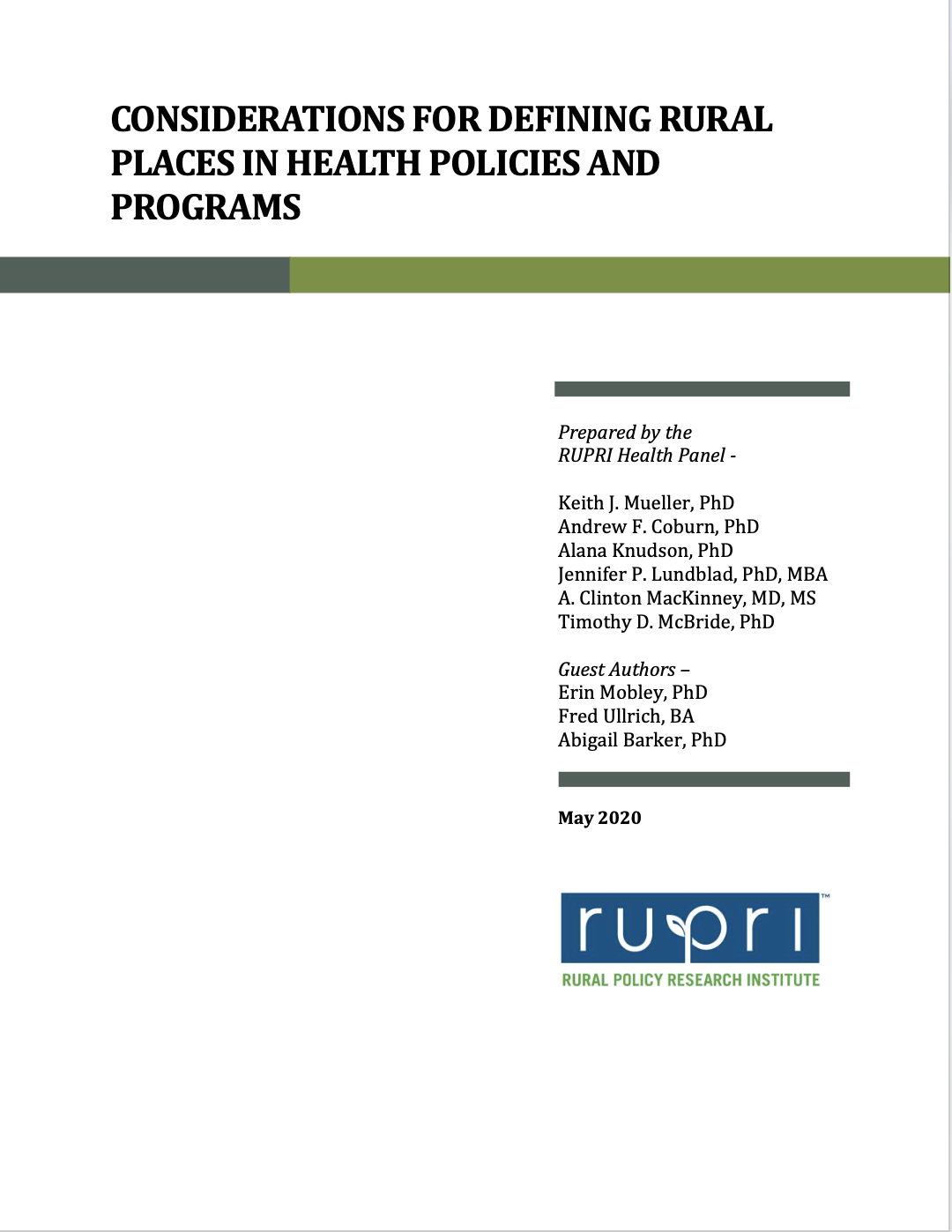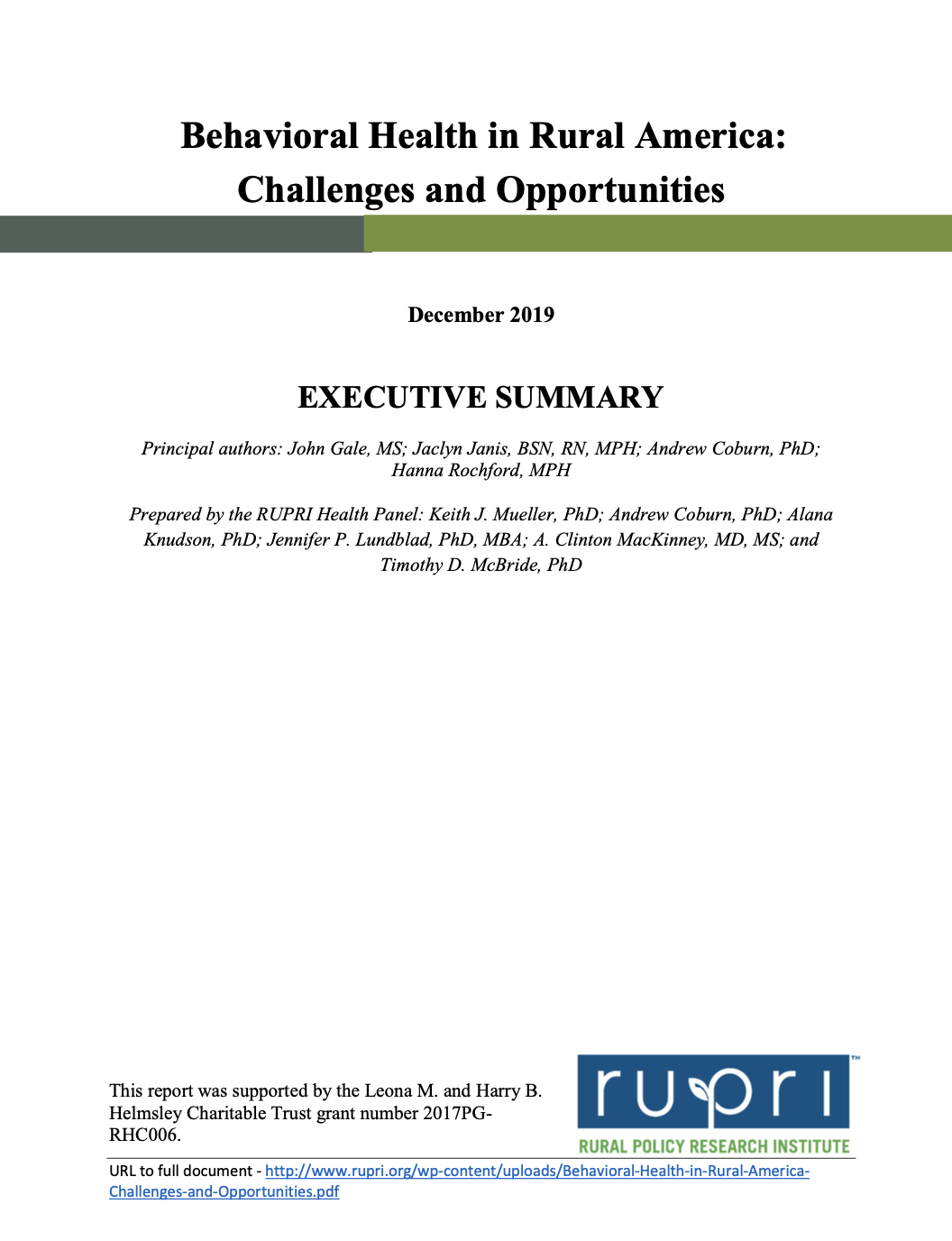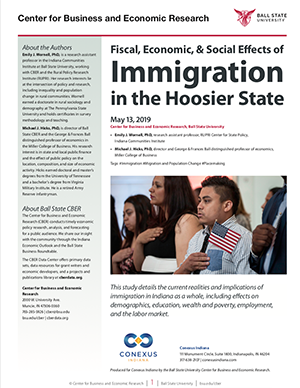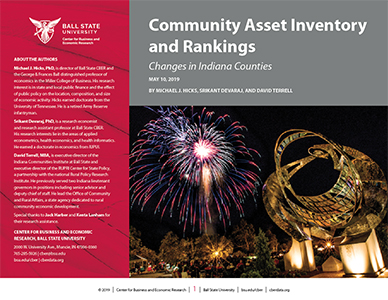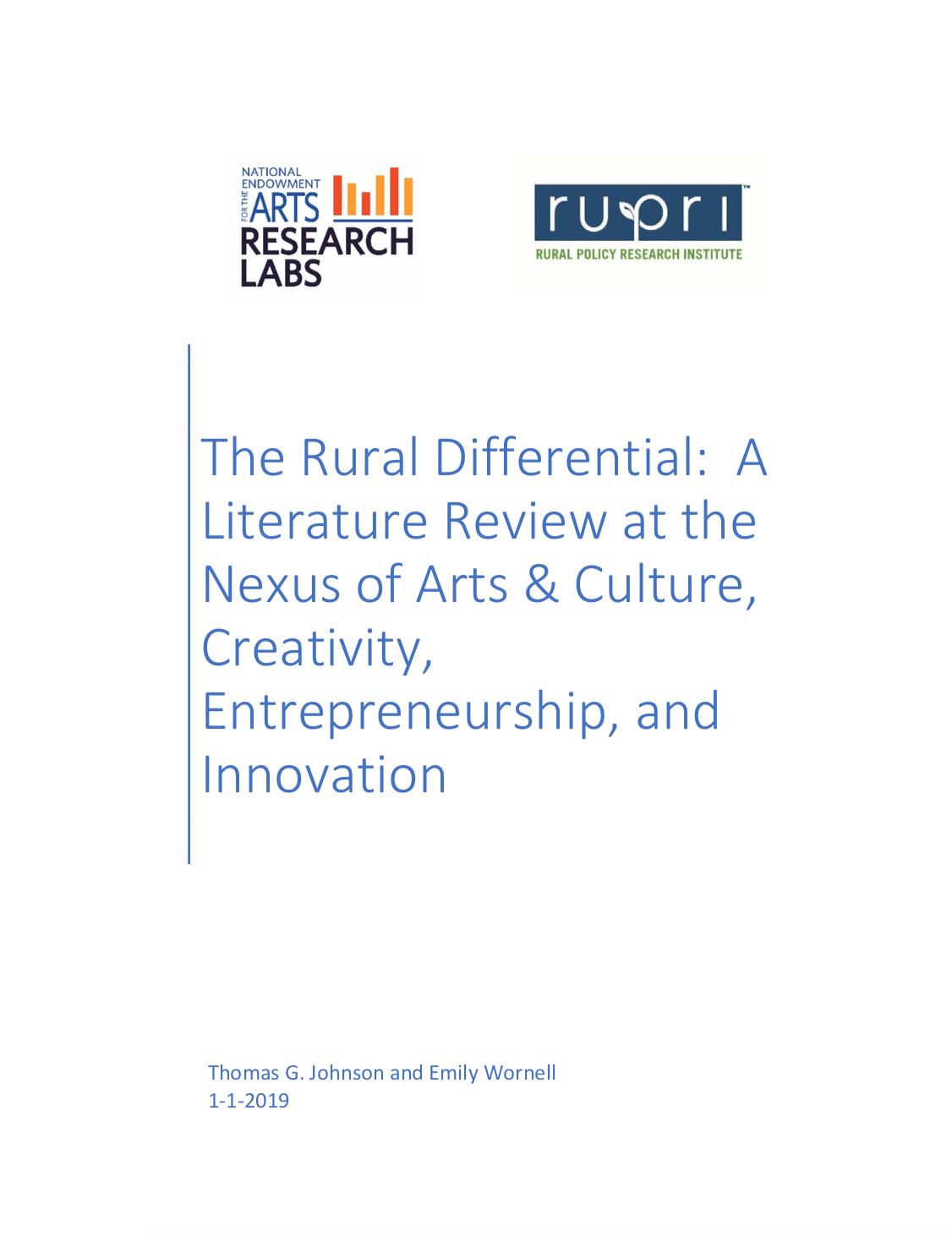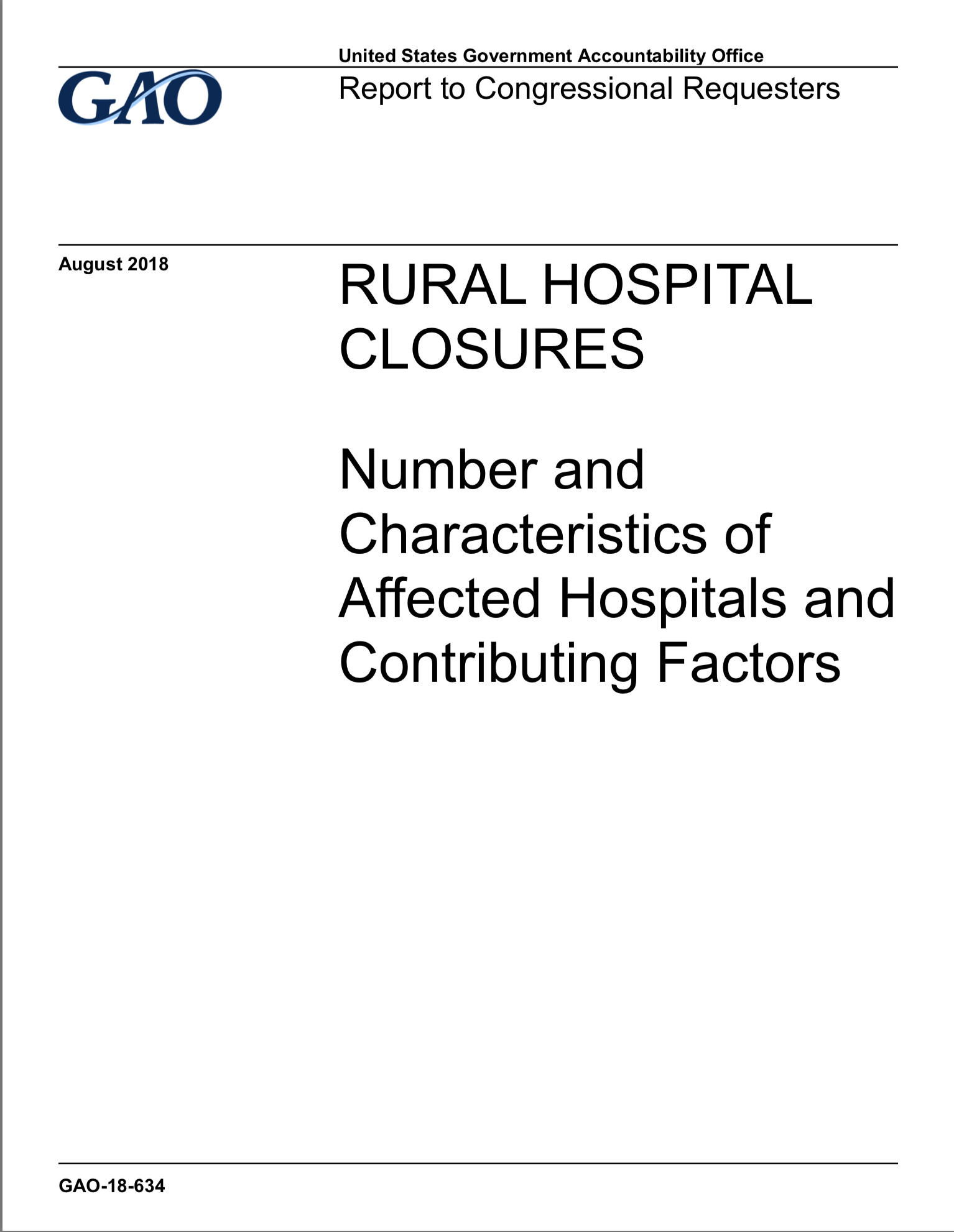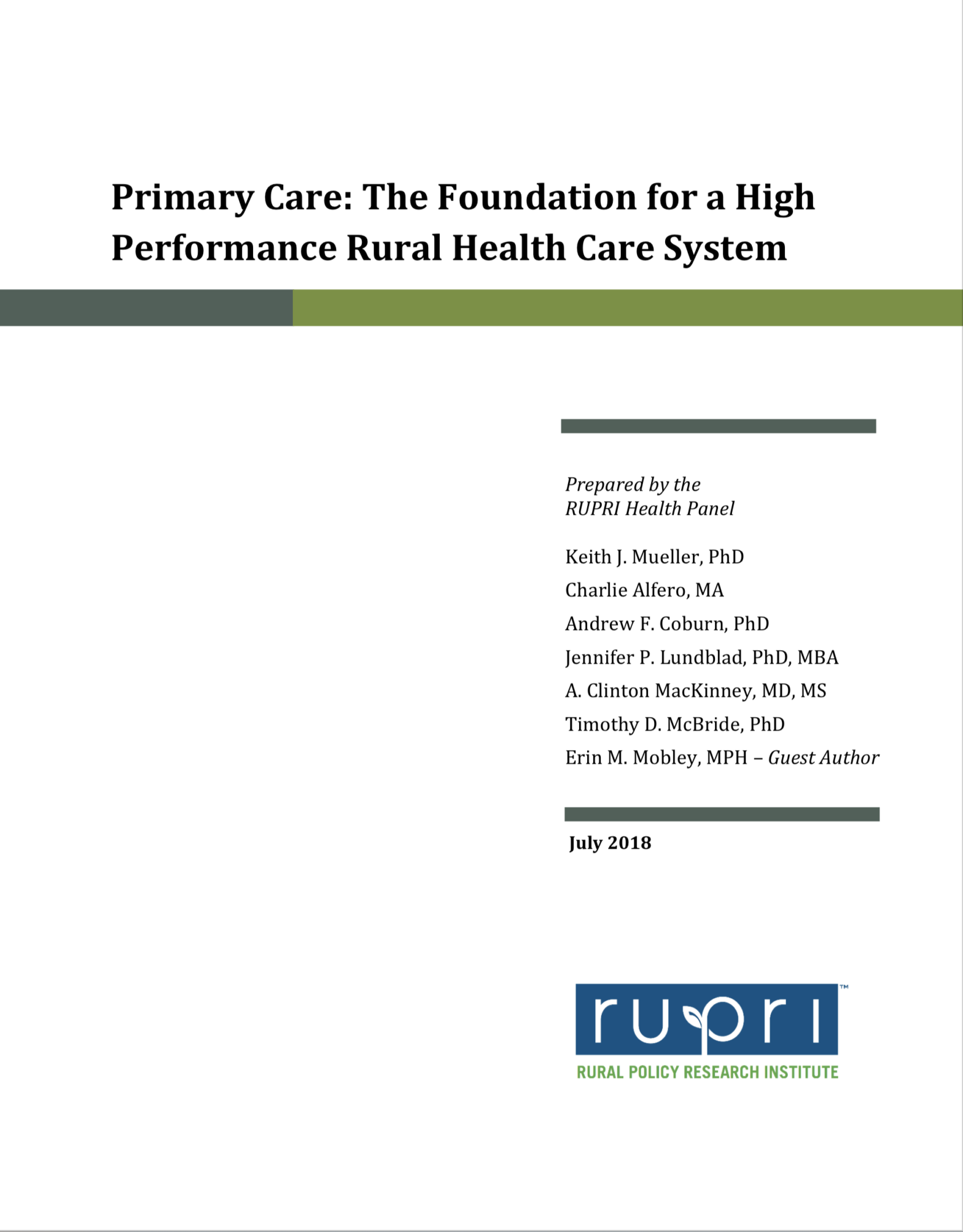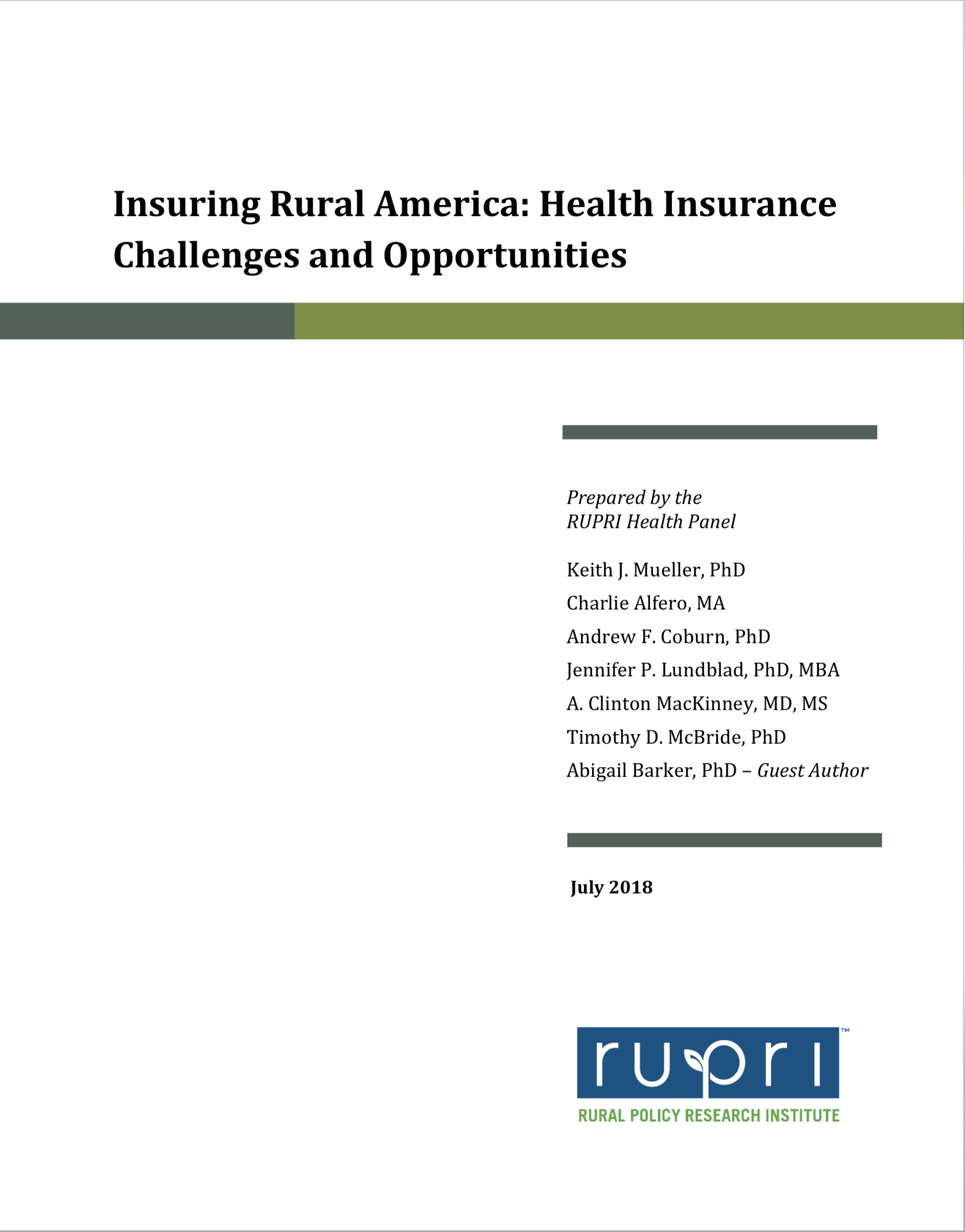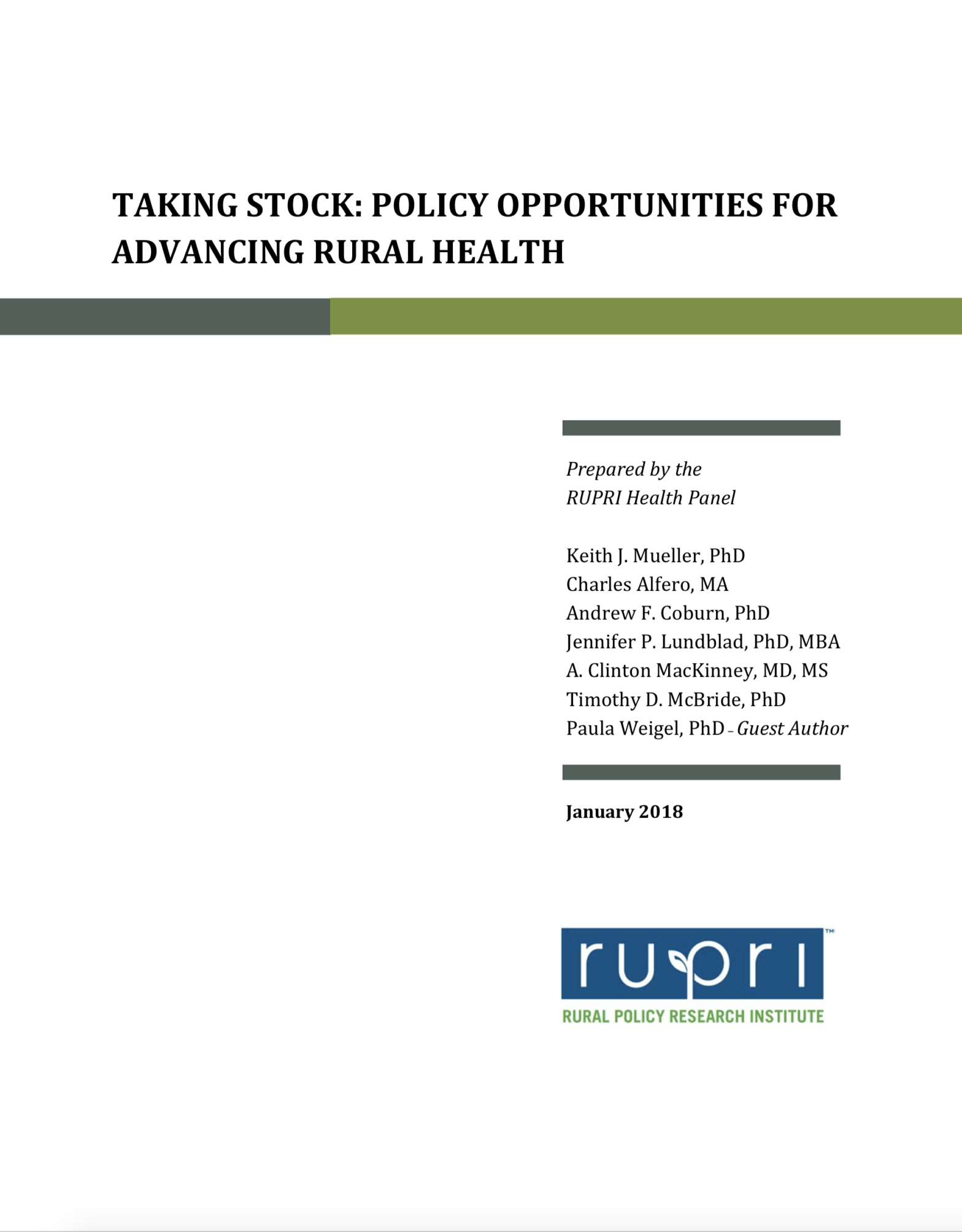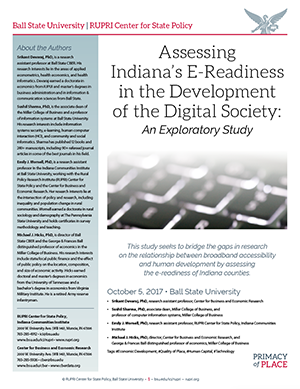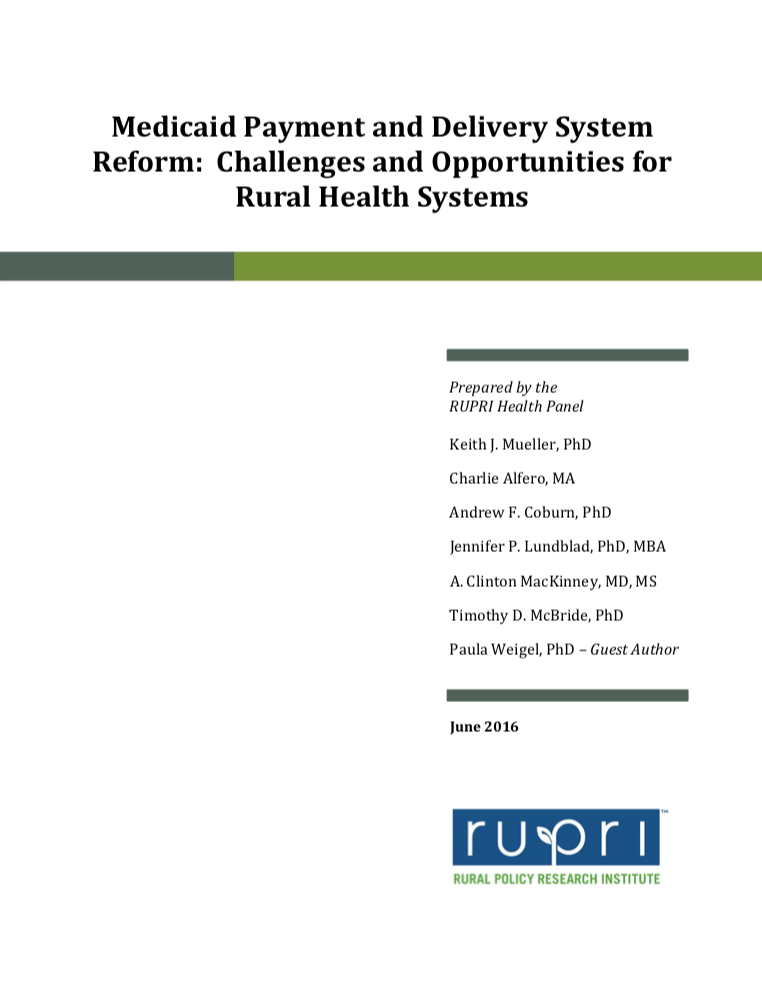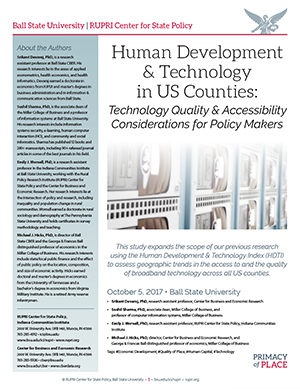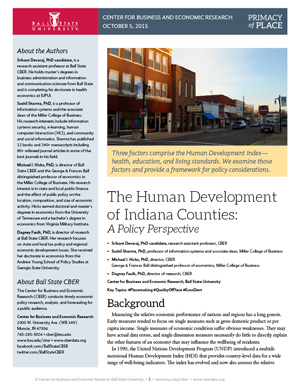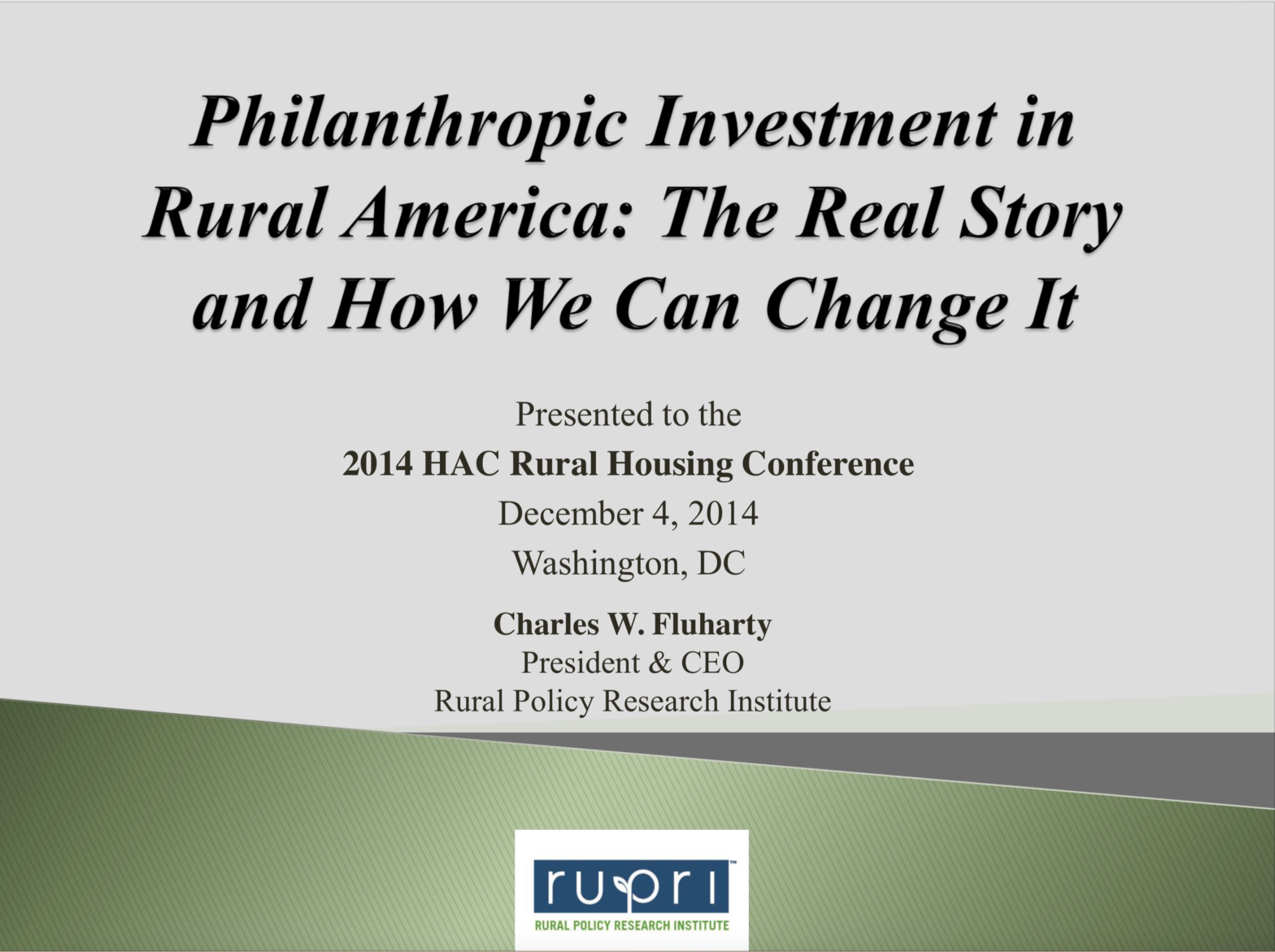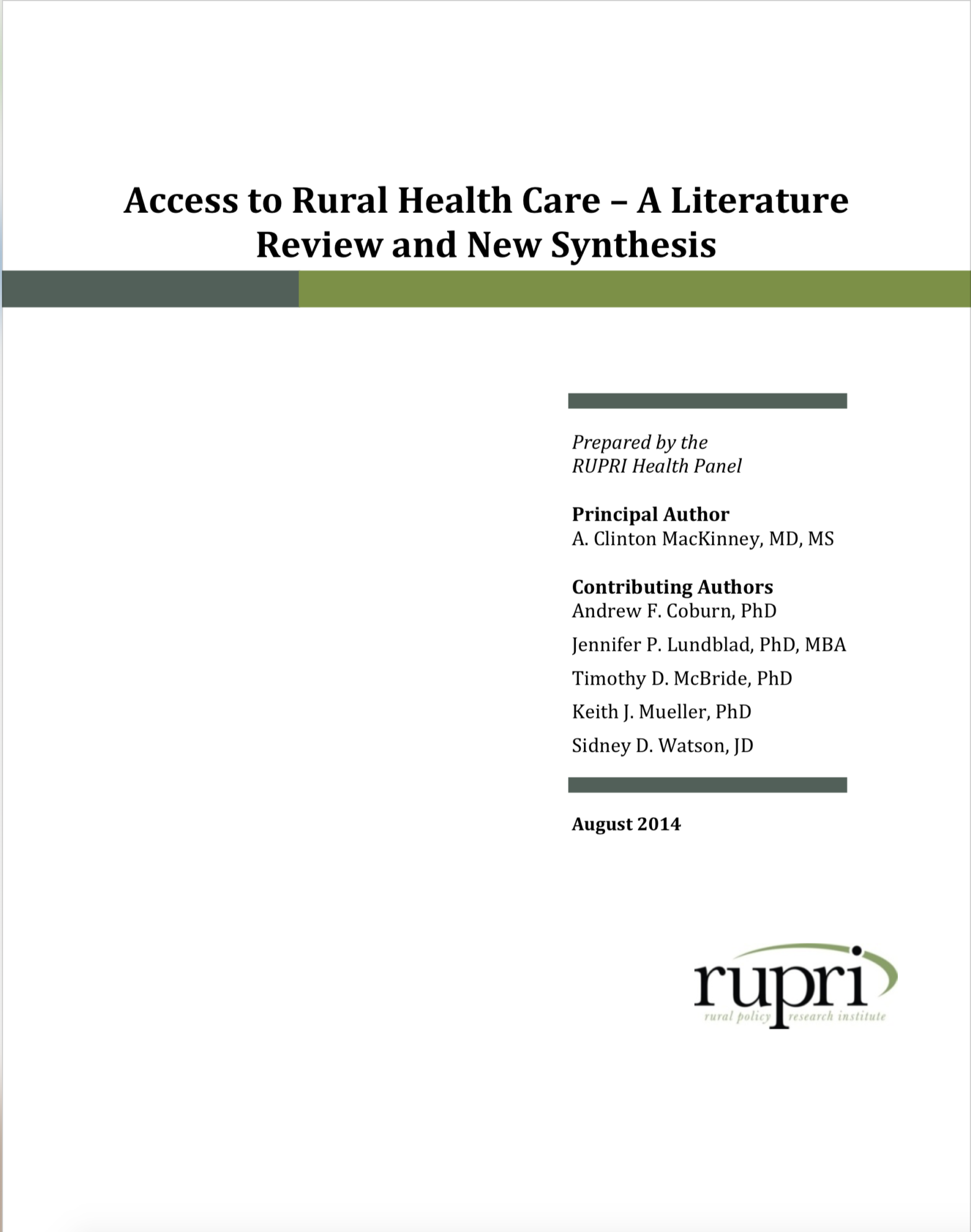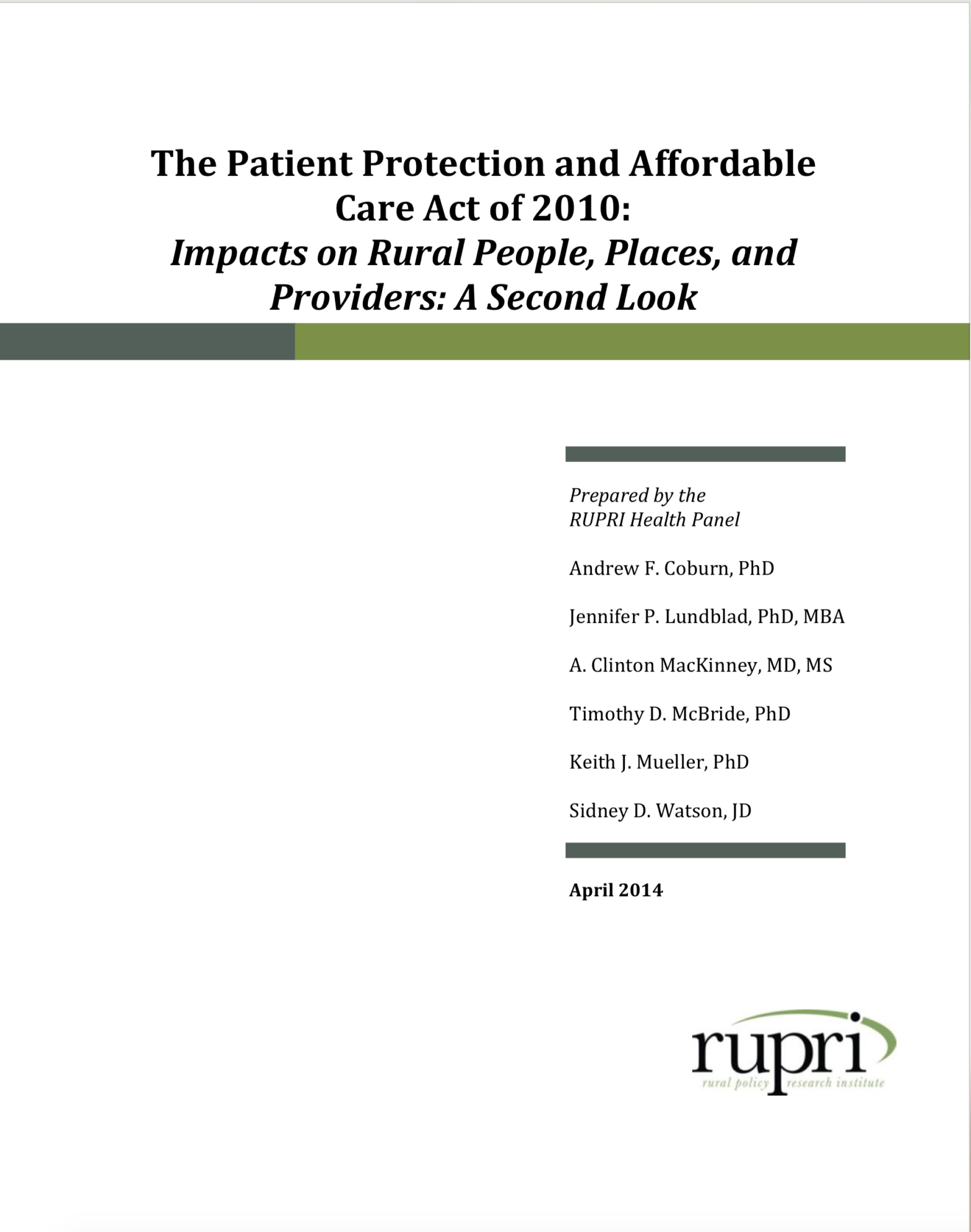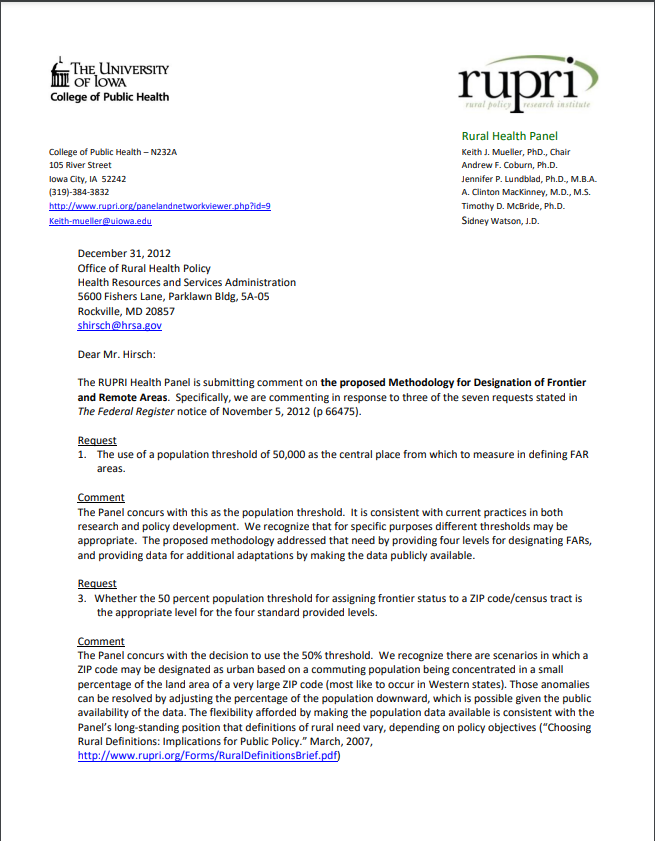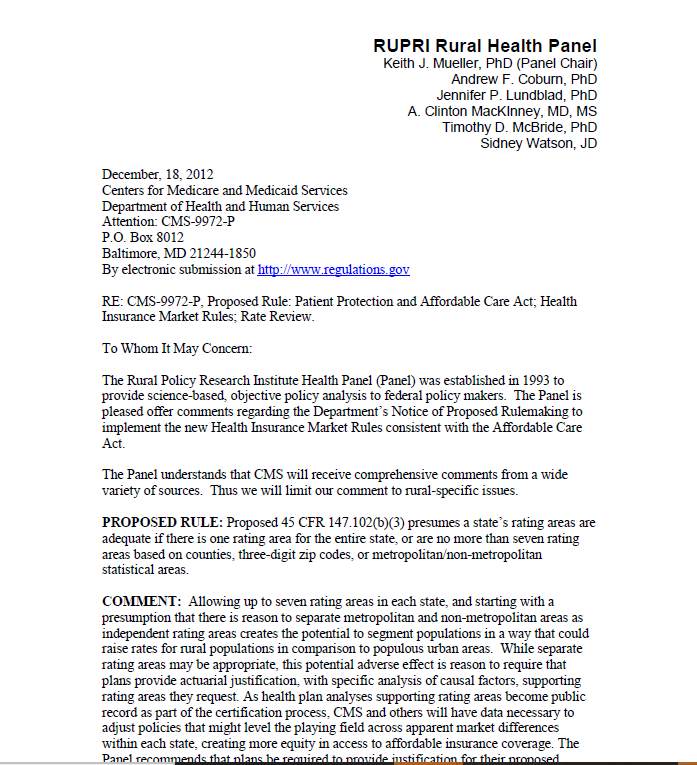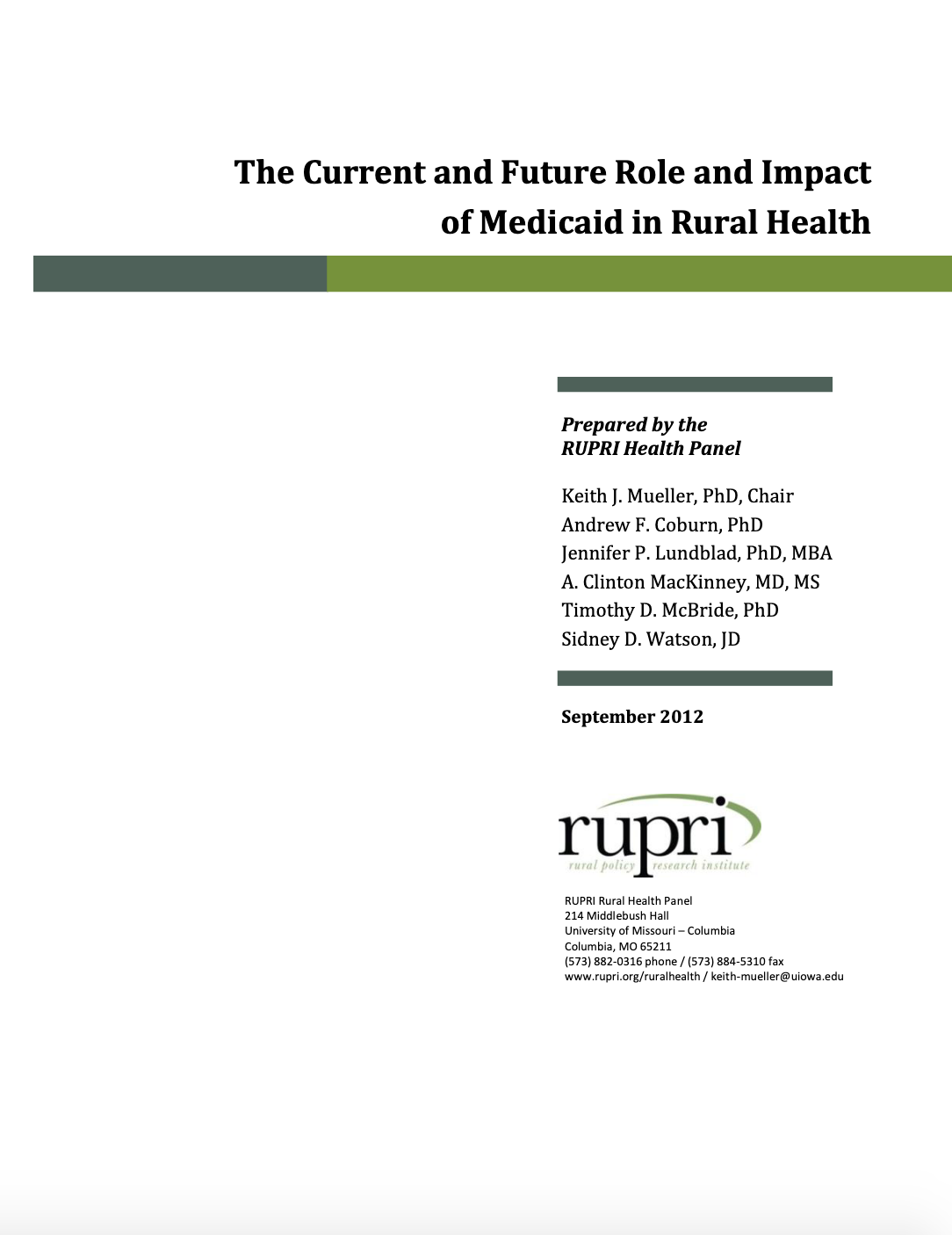Keith Mueller presented Securing a Better Future for Rural Health at the NRHA Annual Meeting in Atlanta. The session presented findings from the 2024 Future of Rural Health Summit held by RUPRI, NRHA & West Health. Please view the presentation here
Category Archives: Report
RUPRI Health Panel Releases “The Future of Rural Health” Report with the National Rural Health Association & West Health. April 2025.
READ The Future of Rural Health Report Here The RUPRI Rural Health Panel, the National Rural Health Association (NRHA) and West Health held a facilitated convening in November, 2024 to identify the needs of the rural health communities, build on existingstrengths, and develop a cohesive approach to improving the health of rural Americans through policy. …
RUPRI Health Panel Provides Comments on CMS RFI on Medicare Advantage Data. May 2024.
RUPRI Health Panel has provided comments on CMS RFI CMS-4207-NCI Medicare Program: Request for Information on Medicare Advantage Data. READ COMMENT LETTER HERE
Rural Hospitals Perspectives on Health System Affiliation.RUPRI Health Panel April 2024.
The RUPRI Health Panel has released a new brief, Rural Hospitals’ Perspectives on Health System Affiliation. This brief explores the current trend in hospital affiliation from a rural perspective and offers guidance to rural hospital leaders in navigating a potential affiliation. With an understanding of the rural context and challenges facing rural hospitals, risks and …
RUPRI Health Panel Submits Comments to House Ways & Means Committee on Improving Access to Health Care in Rural and Underserved Areas. October 2023.
The RUPRI Health Panel offers comments in response to the Committee on Ways and Means Request for Information regarding Improving Access to Health Care in Rural and Underserved Areas. The comments focus on all five topics included in the RFI. The five topics include comments on: Geographic Payment Difference: The Panel recommends that changes to …
National Advisory Committee on Rural Health & Human Services Releases Policy Brief on Rural Childcare.
The National Advisory Committee on Rural Health & Human Services (NACRHHS) has released a new policy brief, Childcare Need & Availability in Rural Areas. The NACRHHS advises the Secretary of the Department of Health & Human Services on health & human service challenges in rural America. The Committee members offer the following policy recommendations for …
RUPRI Health Center Releases New Report on Health Insurance Marketplaces.
The RUPRI Center for Rural Health Policy Analysis has released an update on Health Insurance Marketplaces: Issuer Participation Trends in Non-Metropolitan Places, 2014-22. Read the Report Here. Key Findings Include: Non-metropolitan counties (counties classified as either micropolitan or noncore using urban influence codes) have had less marketplace participation than metropolitan counties since their implementation in …
Continue reading “RUPRI Health Center Releases New Report on Health Insurance Marketplaces.”
Meeting The Behavioral Health Needs of Farm Families in Times of Economic Distress. RUPRI Health Panel. February 2022.
Meeting the Behavioral Health Needs of Farm Families in Times of Economic Distress. Given recent global economic and climate trends, including those induced by the COVID-19 public health emergency, behavioral health consequences related to economic distress will likely continue as a public health concern for the foreseeable future. The RUPRI Health Panel offers guidance for …
Pharmacy Vaccination Service Availability in Nonmetropolitan Counties
The RUPRI Center for Rural Health Policy Analysis releases this report on Pharmacy Vaccination Service Availability in Nonmetropolitan Counties. In February 2021 the White House announced the launch of the first phase of the Federal Retail Pharmacy Program for COVID-19 Vaccination. The “public-private partnership with 21 national pharmacy partners and networks of independent pharmacies” is …
Continue reading “Pharmacy Vaccination Service Availability in Nonmetropolitan Counties”
Rural Cultural Wealth Research Priorities. RUPRI Rural Cultural Wealth Lab. February 2021.
This paper follows an extensive review of the research literature at the intersection of three broad areas—1) rural wealth creation and distribution 2) rural arts and culture, and 3) creativity, innovation, and entrepreneurship. The primary goal of the literature review was to identify the most critical issues that are NOT fully understood about these concepts …
Characteristics & Challenges of Rural Ambulance Agencies. RUPRI Health Panel. January 2021.
The RUPRI Health Panel has released a new brief, Characteristics and Challenges of Rural Ambulance Agencies. Every year, nearly 10 million rural Americans receive EMS care. There are 23,272 ambulance agencies in the U.S. and 73 percent of those agencies report serving rural areas. Thus, rural Americans rely on EMS professionals to deliver life-saving emergency …
Advancing Population Health in Rural Places. RUPRI Health Panel. January 2021.
The RUPRI Health Panel has released a new paper, Advancing Population Health in Rural Places: Key Lessons and Policy Opportunities. This paper advances policy discussion of population health in rural places, focusing on the role of rural health care organizations. Lessons from ongoing programs provide policy considerations. Medicare and Medicaid programs should prioritize staff and …
Continue reading “Advancing Population Health in Rural Places. RUPRI Health Panel. January 2021.”
The Evolving Landscape of National Telehealth Policies During a Public Health Emergency: Responsiveness to Rural Needs. RUPRI Health Panel. October 2020.
The coronavirus pandemic precipitated significant but temporary changes in telehealth policy and the use of telehealth services to ensure access to needed health services during a public health emergency (PHE). Extending the temporary policy changes will require statutory and regulatory action. This paper takes stock of current telehealth policies and assesses options for expanding the …
Considerations for Defining Rural Places in Health Policies and Programs
The RUPRI Health Panel has released a new brief that identifies key questions to ask when creating, modifying, or using a definition. Rural definitions in statute and policy are used to direct resources to underserved peoples. But changes in population behavior and Census processes have led to concern about historic methods of defining rural. This …
Continue reading “Considerations for Defining Rural Places in Health Policies and Programs”
Behavioral Health in Rural America: Challenges and Opportunities. RUPRI Health Panel. December 2019.
The prevalence of mental health and substance use diagnoses and unmet treatment needs are not equally distributed, with rural residence being one factor associated with these differences. Moreover, the rural context has proven challenging for ensuring the availability of and access to prevention, diagnosis, treatment, and recovery services in rural areas. This paper reviews the …
A New Conceptual Framework for Rural Cultural Wealth. A product of the NEA RUPRI Rural Cultural Wealth Lab. November 2019.
The New Conceptual Framework for Rural Cultural Wealth describes a conceptual framework within which the arts, culture, and cultural wealth can be understood, measured, and compared. While such a framework can be applied equally well in any geographic context, the focus in this document is on the rural and small city context. Examples and specific …
Fiscal, Economic, and Social Effects of Immigration in the Hoosier State
View Study This study details the current realities and implications of immigration in Indiana as a whole, including effects on demographics, education, wealth and poverty, employment, and the labor market. Study sponsored by Conexus Indiana. Written at Ball State University by Emily J. Wornell, PhD and Michael J. Hicks, PhD; published May 13, 2019. To …
Continue reading “Fiscal, Economic, and Social Effects of Immigration in the Hoosier State”
Community Asset Inventory and Rankings: Changes in Indiana Counties
View Report In this report, we summarize the major changes in rankings for all categories of CAIR between 2012 and 2018. In addition, we also develop a ‘housing barometer’ tool for each county based on a county’s home prices relative to the state and its growth. Visit the CAIR website at https://cair.cberdata.org to explore the full features …
Continue reading “Community Asset Inventory and Rankings: Changes in Indiana Counties”
Toward a High Performing Rural Health Care System: Key Issues and Recommendations from Rural Health Care System Innovators. Roundtable with Rural Health Innovators. RUPRI Rural Health Panel. December 2018.
Toward a High Performing Rural Health Care System: Key Issues and Recommendations from Rural Health Care System Innovators View Report On December 6-7, 2018, the Rural Health Policy Research Institute’s (RUPRI) Health Panel convened a meeting in Washington, DC, of rural health leaders from around the country to discuss strategies and models for rural health …
Existing Conceptual Models of Arts & Culture: An Inventory. Rural Cultural Wealth Lab. January 2019.
The Existing Conceptual Models of Arts & Culture: An Inventory describes and compares conceptual models of arts and culture, creativity, innovation, entrepreneurship, and well-being. Each model attempts to capture a different aspect of this very complex system. Each model therefore provides important insights that help us understand the role and dynamics of arts and culture …
The Rural Differential: A Literature Review at the Nexus of Arts & Culture, Creativity, Entrepreneurship, and Innovation
Our review of the literature reveals that: Current research in arts and culture, creativity, and innovation has a significant metropolitan bias. Most research either focuses solely on metropolitan issues or assumes the arts and culture issues are uniform across the rural-urban continuum. More research on the effect of rural arts and culture on the vitality …
Primary Care: The Foundation for a High-Performance Rural Health Care System. RUPRI Health Panel. July 2018.
This paper will review elements of a robust rural primary care system, including development and maintenance of a high performance rural primary care system and workforce as well as policy considerations and opportunities that address the sustainability of rural primary care. Written by Keith J. Mueller (PhD), Charlie Alfero (MA), Andrew F. Coburn (PhD), Jennifer …
Insuring Rural America: Health Insurance Challenges and Opportunities. RUPRI Health Panel. July 2018.
This paper discusses the realities and challenges of designing a market structure that will result in affordable health insurance being offered in rural markets, and reviews the rural implications of policies affecting rural health insurance markets and health systems. Written by Keith J. Mueller (PhD), Charlie Alfero (MA), Andrew F. Coburn (PhD), Jennifer P. Lundblad …
Taking Stock: Policy Opportunities for Advancing Rural Health. RUPRI Health Panel. January 2018.
This paper examines the progress of health system transformation and the gaps that remain as they affect rural people, places, and providers. The health system transformation activities examined here are not limited to the Patient Protection and Affordable Care Act of 2010 (PPACA), but also touch upon activities undertaken by states, insurance plans, and public …
Rural Long-Term Services and Support: A Primer. RUPRI Health Panel. November 2017.
Rural Long-Term Services and Supports: A Primer provides policymakers and other interested stakeholders a primer on rural long-term services and supports (LTSS): (1) the fundamentals of the rural LTSS system, (2) rural access to and use of LTSS, and (3) discussion of the opportunities within and limitations of current Federal and State LTSS policy for advancing …
Assessing Indiana’s E-Readiness in the Development of the Digital Society
View Report This study seeks to bridge the gaps in research on the relationship between broadband accessibility and human development by assessing the e-readiness of Indiana counties. Written by Srikant Devaraj, PhD; Sushil Sharma, PhD; Emily J. Wornell, PhD; and Michael J. Hicks, PhD (Ball State University); published Oct. 5, 2017.
After Hospital Closure: Pursuing High Performance Rural Health System without Inpatient Care. RUPRI Health Panel. June 2017.
The RUPRI Health Panel describes opportunities for rural communities to develop a high-performance rural health system after hospital closure, including three case studies that describe real-world transitions from a hospital-based locus of care to new models of care delivery in rural places. After Hospital Closure: Pursuing High Performance Rural Health System without Inpatient Care This paper describes …
RUPRI Leader – Interview with Mario Gutierrez on the future of healthcare
We sat down to talk about the future of healthcare with Mario Gutierrez, who serves as the Executive Director of the Center for Connected Health Policy (CCHP). Last year, Gutierrez participated in a panel with TSC Director Pamela Villacorta at the Governor’s Conference on Aging and Disabilities. We asked him about his perspective on the state of …
Continue reading “RUPRI Leader – Interview with Mario Gutierrez on the future of healthcare”
An unsung farm bill hero, rural development needs more champions: Agri
WASHINGTON, March 19, 2017 – U.S. farmers are getting grayer, their national numbers are on the decline and fewer young people are moving back to farms and ranches. The average age of a principal operator of a U.S. farm is now over 58 years old. Absent opportunities for manufacturing, recreation or other industries, many of …
Continue reading “An unsung farm bill hero, rural development needs more champions: Agri”
RUPRI Rural Cultural Wealth Lab: A Conceptual Design
The Rural Cultural Wealth Lab unites the knowledge and experiences of a diverse array ofscholars and practitioners to address some of the most critical issues and opportunities facingrural people and places. It fulfills this need by building innovative metrics that will strengthenpolicymakers’ understanding of the various relationships and assets that define and reveal ruralcommunity wealth.To …
Continue reading “RUPRI Rural Cultural Wealth Lab: A Conceptual Design”
Medicaid Payment and Delivery System Reform: Challenges and Opportunities for Rural Health Systems. RUPRI Health Panel. June 2016.
Medicaid has grown significantly in its importance to rural health systems and communities; a higher proportion (22 percent) of rural residents was enrolled in Medicaid than Medicare (20 percent) in 2014. At the same time, the use of payment and delivery innovations has grown significantly, but varies across the U.S. As a result of expansions …
Medicare Value-based Payment Reform: Priorities for Transforming Rural Health Systems
View Report | Related: View Policy Brief In recognition of unsustainable healthcare cost growth and sub-optimal delivery system performance, the Patient Protection and Affordable Care Act of 2010 (ACA) contains provisions that redesign healthcare payment and delivery. ACA payment change provisions are driving delivery system reform by making healthcare organizations more accountable for patients’ health …
Human Development & Technology in US Counties
View Policy Paper In this study, the authors expand the scope of their previous research using the Human Development & Technology Index (HDTI) to assess geographic trends in the access to and the quality of broadband technology across all US counties. This work includes considerations for policy makers. Written by Srikant Devaraj, PhD; Sushil Sharma, …
Continue reading “Human Development & Technology in US Counties”
The Human Development Index of Indiana Counties: A Policy Perspective
View Policy Paper Three factors comprise the Human Development Index—health, education, and living standards. We examine those factors and provide a framework for policy considerations. This study is a research contribution to Primacy of Place, an interdisciplinary initiative at Ball State University (home of the RUPRI Center for State Policy). Primacy of Place focuses on …
Continue reading “The Human Development Index of Indiana Counties: A Policy Perspective”
Accountable Care Communities in Rural: Laying the Groundwork in Humboldt County, CA . RUPRI Health & Human Services Panels. June 2015.
This joint paper was authored by members of both the Health and Human Services Panel in June 2015. The paper presents a case for the viability of Accountable Care Community (ACC) models in rural communities, including in rural Humboldt County, California. Accountable Care Communities reflect a unified approach to improving the health and reducing the …
Appalachia starts long, scary slog beyond mining Manuel Quiñones
COAL:Appalachia starts long, scary slog beyond miningManuel Quiñones, E&E reporterGreenwire: Tuesday, March 17, 2015Chuck Fluharty parachutes into busted rural economies and tries to figure out how to get them out of the ditch. His latest challenge: Appalachia. Fluharty’s Rural Policy Research Institute is focused on eastern Kentucky, whose coal fields have bled thousands of jobs …
Continue reading “Appalachia starts long, scary slog beyond mining Manuel Quiñones”
Philanthropic Investment in Rural America: The Real Story and How We Can Change It
This presentation touches upon the rural need and the rationale for philanthropic investment. It also discusses the place of the public sector in private philanthropy. Presented by Charles W. Fluharty (President and CEO, Rural Policy Research Institute) to the 2014 HAC Rural Housing Conference on December 4, 2014 in Washington, D.C. View Presentation
Advancing the Transition to a High-Performance Rural Health System. RUPRI Health Panel. November 2014.
In Advancing the Transition to a High-Performance Rural Health System, the RUPRI Health Panel discusses strategies and options for creating a pathway to a transformed, high-performing rural health system. This paper builds on the RUPRI Health Panel’s earlier paper that conceptually defined the core elements of a high-performance rural health system. We have also incorporated …
Access to Rural Health Care – Literature Review and New Synthesis. RUPRI Health Panel. August 2014.
This report reviews important access definitions and frameworks from the literature. The review serves as a concept map to create a unique synthesis of perspectives that may be used by researches and policy makers to design or clarify access to health care providers. Prepared in August 2014 by the RUPRI Health Panel: A. Clinton MacKinney, …
Persistent Poverty Dynamics: Understanding Poverty Trends Over 50 Years
High and persistent poverty is an enduring characteristic of many U.S. counties. More than one in five (23 percent) U.S. counties had poverty rates of 20 percent or more in 2009. Half (49.6 percent) of these counties were persistent high poverty counties, having had poverty rates of 20 percent or more in each of the …
Continue reading “Persistent Poverty Dynamics: Understanding Poverty Trends Over 50 Years”
The Patient Protection and Affordable Care Act of 2010: Impacts on Rural People, Places, and Providers: 2010 First and 2014 Second Look. RUPRI Health Panel.
These two policy documents from 2010 and 2014 take a first and second look at the implementation of the Patient Protection and Affordable Care Act of 2010 and how it contributes to reshaping the health care delivery landscape, particularly in rural areas. Prepared in September 2010 and April 2014 by the RUPRI Health Panel: Andrew …
RUPRI Health Panel Provides Comments to HRSA on Designation of Frontier & Remote Areas. December 2012.
RUPRI Health Panel Provided Comments to HRSA on Proposed Designation of Frontier & Remote Areas. December 29, 2012. Read Comment Letter Here
RUPRI Health Panel Provides Comments to CMS on Health Insurance Market Rule. December 2012.
RUPRI Health Panel Provided Comments to CMS-9972-P, Proposed Rule: Patient Protection and Affordable Care Act; Health Insurance Market Rules; Rate Review. December 18, 2012. Read Comment Letter Here
The Current and Future Role and Impact of Medicaid in Rural Health. RUPRI Health Panel. September 2012.
This brief outlines and describes the current Medicaid program and its importance to rural America. It also discusses rural implications of program expansion, including whether and how states choose to implement changes. View Report This report was written by Health Panel Members Keith Mueller, Andrew Coburn, Jennifer Lundblad, A. Clinton MacKinney, Timothy McBride, Sidney Watson …
Anticipating the Rural Impact of Medicare Value-Based Purchasing. RUPRI Rural Health Panel. April 2012.
Click Here for Brief
Humboldt County California: A Promising Model for Human Services Integration and Transformation. RUPRI Rural Human Services Panel. February 2012.
Click Here for Paper


